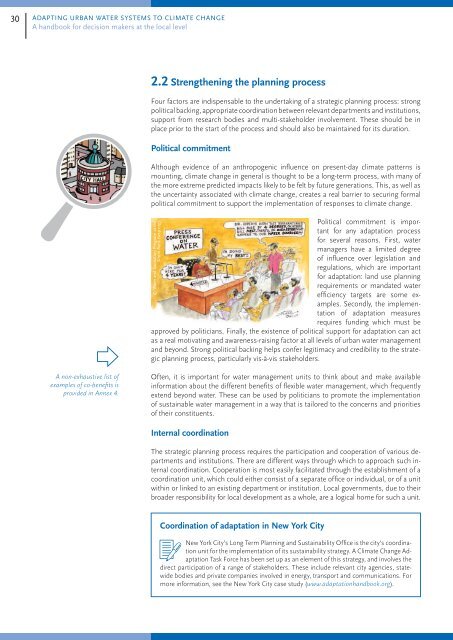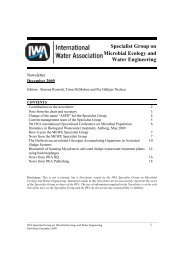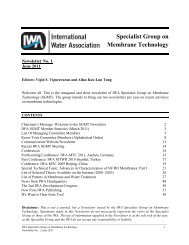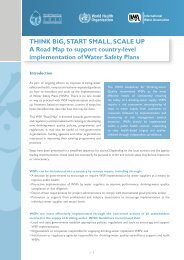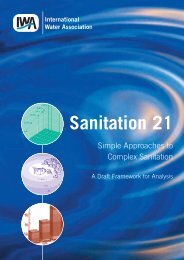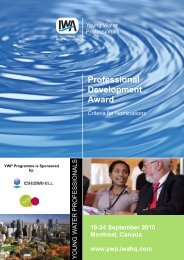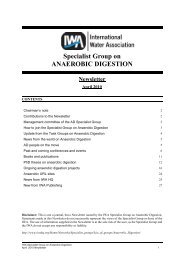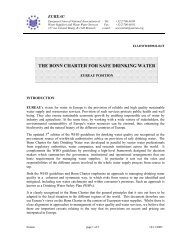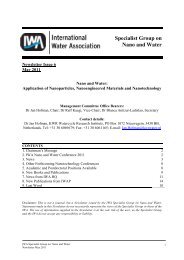AdApting urbAn wAter systems to climAte chAnge - IWA
AdApting urbAn wAter systems to climAte chAnge - IWA
AdApting urbAn wAter systems to climAte chAnge - IWA
Create successful ePaper yourself
Turn your PDF publications into a flip-book with our unique Google optimized e-Paper software.
30 Adapting urban water <strong>systems</strong> <strong>to</strong> climate change<br />
A handbook for decision makers at the local level<br />
Section 2<br />
A strategic planning framework for adaptation<br />
31<br />
2.2 Strengthening the planning process<br />
Four fac<strong>to</strong>rs are indispensable <strong>to</strong> the undertaking of a strategic planning process: strong<br />
political backing, appropriate coordination between relevant departments and institutions,<br />
support from research bodies and multi-stakeholder involvement. These should be in<br />
place prior <strong>to</strong> the start of the process and should also be maintained for its duration.<br />
Political commitment<br />
Although evidence of an anthropogenic influence on present-day climate patterns is<br />
mounting, climate change in general is thought <strong>to</strong> be a long-term process, with many of<br />
the more extreme predicted impacts likely <strong>to</strong> be felt by future generations. This, as well as<br />
the uncertainty associated with climate change, creates a real barrier <strong>to</strong> securing formal<br />
political commitment <strong>to</strong> support the implementation of responses <strong>to</strong> climate change.<br />
© Water and Sanitation Program at the<br />
World Bank (wsp.org)<br />
Political commitment is important<br />
for any adaptation process<br />
for several reasons. First, water<br />
managers have a limited degree<br />
of influence over legislation and<br />
regulations, which are important<br />
for adaptation: land use planning<br />
requirements or mandated water<br />
efficiency targets are some examples.<br />
Secondly, the implementation<br />
of adaptation measures<br />
requires funding which must be<br />
approved by politicians. Finally, the existence of political support for adaptation can act<br />
as a real motivating and awareness-raising fac<strong>to</strong>r at all levels of urban water management<br />
and beyond. Strong political backing helps confer legitimacy and credibility <strong>to</strong> the strategic<br />
planning process, particularly vis-à-vis stakeholders.<br />
Stakeholder involvement through coordination in London<br />
The Greater London Authority has set up the London Climate Change Partnership<br />
as its coordination unit for climate change. The partners consist not only of relevant<br />
government departments, but also of other key stakeholders such as insurance<br />
companies, non-governmental organisations and private utilities. For more information,<br />
see the London case study (www.adaptationhandbook.org).<br />
Cities can also establish specific coordination units <strong>to</strong> take a broad view of management<br />
of all urban sec<strong>to</strong>rs in the face of climate change. Water management, arguably the most<br />
vital urban system and potentially one of the most affected by climate change, naturally<br />
forms one of the main areas of concern of these units. Often, and ideally, these units or<br />
the sub-groups they form become arenas for multi-stakeholder involvement. In principle,<br />
urban water managers are also able <strong>to</strong> develop plans without such internal coordination,<br />
while taking climate change in<strong>to</strong> account; however, the resulting adaptation actions are<br />
likely <strong>to</strong> be less effective.<br />
Collaboration with research<br />
The complexity and uncertainty inherent <strong>to</strong> both climate change manifestations and associated<br />
adaptation responses requires having the best possible knowledge of current<br />
conditions and likely long-term changes. Because of this, active collaboration with researchers<br />
is vital. Scenario building is a phase for which research input is particularly<br />
important, as the plausibility of these scenarios (as well as a sound assessment of the<br />
degree of confidence in them) will determine <strong>to</strong> a great extent the outcome of the city’s<br />
water management strategy. Researchers can also help with the development of innovative<br />
solutions.<br />
A non-exhaustive list of<br />
examples of co-benefits is<br />
provided in Annex 4.<br />
Often, it is important for water management units <strong>to</strong> think about and make available<br />
information about the different benefits of flexible water management, which frequently<br />
extend beyond water. These can be used by politicians <strong>to</strong> promote the implementation<br />
of sustainable water management in a way that is tailored <strong>to</strong> the concerns and priorities<br />
of their constituents.<br />
Internal coordination<br />
The strategic planning process requires the participation and cooperation of various departments<br />
and institutions. There are different ways through which <strong>to</strong> approach such internal<br />
coordination. Cooperation is most easily facilitated through the establishment of a<br />
coordination unit, which could either consist of a separate office or individual, or of a unit<br />
within or linked <strong>to</strong> an existing department or institution. Local governments, due <strong>to</strong> their<br />
broader responsibility for local development as a whole, are a logical home for such a unit.<br />
Coordination of adaptation in New York City<br />
New York City’s Long Term Planning and Sustainability Office is the city’s coordination<br />
unit for the implementation of its sustainability strategy. A Climate Change Adaptation<br />
Task Force has been set up as an element of this strategy, and involves the<br />
direct participation of a range of stakeholders. These include relevant city agencies, statewide<br />
bodies and private companies involved in energy, transport and communications. For<br />
more information, see the New York City case study (www.adaptationhandbook.org).<br />
Learning Alliances: Bridging the gap between research and practice<br />
Learning Alliances are a type of action research which attempts <strong>to</strong> bridge the gap between<br />
the scientists and experts on one hand, and water users as well as other stakeholders on<br />
the other. In the course of the SWITCH project, they have been set up and tested in a<br />
number of cities worldwide. The logic of the Learning Alliance requires that the starting<br />
research agenda itself be formulated in conjunction with stakeholders and address their<br />
main concerns. The research itself is not solely conducted by experts but shared with the<br />
stakeholders. Solutions resulting from an organised joint learning process such as this are<br />
more likely <strong>to</strong> be adopted in practice.<br />
Stakeholder involvement<br />
Stakeholders are individuals or entities that have interest in a particular decision or<br />
process, either because they are affected by it or because they can influence it in some<br />
way themselves. Multi-stakeholder involvement is the process of engaging with these<br />
stakeholders in a collaborative manner. Although it is certainly technically feasible –<br />
as is demonstrated in many urban areas – <strong>to</strong> manage an urban water system without<br />
stakeholders, the sustainability and adaptive capacity of the system can significantly<br />
be strengthened through their involvement. If not, the costs of mismanagement are<br />
transferred from one ac<strong>to</strong>r <strong>to</strong> another, and the overall efficiency of water management<br />
is restricted. Multi-stakeholder involvement is therefore necessary <strong>to</strong> make the most of<br />
strategic planning as well as <strong>to</strong> realise integration in urban water management more<br />
generally.


